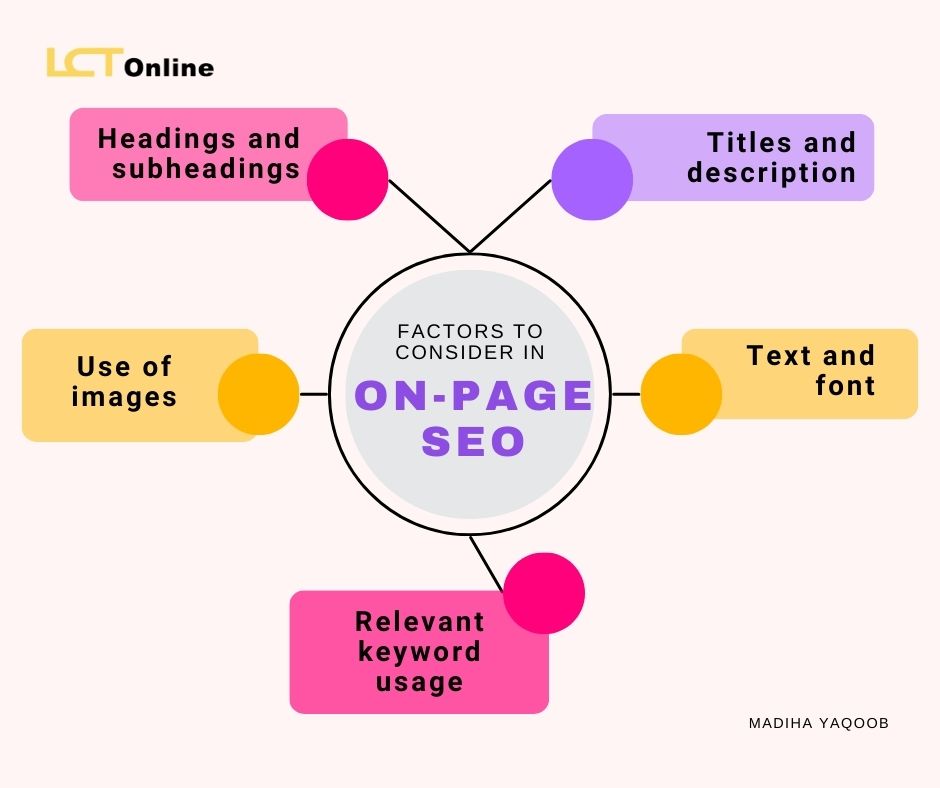On page SEO optimization:
On page SEO optimization assumes a fundamental part in upgrading your site’s web search tool permeability and generally speaking internet-based presence. Learning on-page SEO includes a variety of methods and strategies that assist search engines in comprehending your web pages’ content and relevance. By carrying out compelling on-page enhancement, you can build the possibilities of your site positioning higher, driving more designated traffic, and eventually accomplishing your web-based objectives.
The main components of on-page SEO:
Including the main keyword in your title: The primary keyword that you want to rank for ought to be included in the title of your website. This enables users and search engines to quickly comprehend your content’s topic and relevance.
Short URL: For on-page SEO to work, you need to use a URL that is clear and concise. To give users and search engines more context, avoid URLs that are too long and ensure that they differ from the title.
Meta description: The meta depiction gives a concise rundown of the content on a site page. In order to entice users to click on your page in the search results, it ought to include the title, description, and focus keywords that are pertinent.
Inbound and outbound link: It is essential to include both internal and external links in your content. Inward connections direct clients to other pertinent pages on your site, further developing client experience and assisting web search tools with exploring your webpage. Your content’s credibility can be improved by including external links to reliable sources.
SEO optimization images: Web pages aren’t complete without images. Utilize descriptive filenames, relevant alt tags, and file compression to optimize images. This makes it possible for search engines to comprehend the visual content, increases page load speed, and enhances the user experience.
User readability optimization: Guaranteeing your substance is effectively intelligible and conceivable is significant. Structure your content with the right headings and subheadings, use the right font size and style, and write paragraphs that are interesting and short.
Factors to consider in On-page SEO:
To effectively optimize your on-page SEO.

Headings and subheadings: Coordinate your substance with clear headings and subheadings. This assists clients with exploring your page and permits web crawlers to figure out the design and pecking order of your substance.
Use of images: Consolidate pertinent and outwardly engaging pictures all through your substance. Images can make users more engaged and give your written information more context. seo optimization images play a vital role in it.
Titles and description: Create captivating meta descriptions and titles for each page. Users’ decision to click on your page is influenced by these elements, which appear in search results.
Text and font: Utilize intelligible textual styles and fitting text dimensions to guarantee simple coherence. To make long passages of text easier to read, break them up into smaller paragraphs.
Relevant keyword usage: Include relevant keywords in your content naturally. Stay away from watchword stuffing and spotlight on giving important data that fulfill client expectations.
Writing engaging content for on-page SEO:
Adopting a conversational writing style is essential when creating content for on-page SEO. Consider the accompanying tips to really draw in peruses:
Simplifying the language: Use simple language that is easily understood by a large audience and write in a way that is both clear and concise.
Considering the user’s perspective: Throughout the content creation process, keep the user in mind. Comprehend their requirements, address their problem areas, and give arrangements or important data.
Understanding user intent and competition: Investigate the search intent behind your chosen keywords. Investigate your rivals’ substance to distinguish regions for development and separation.
Considering the user intent: Adjust your substance to the particular hunt aim of your interest group. Determine whether they are looking for information, a solution to a problem, or a purchase.
Incorporating social media signals: Encourage sharing and interaction with your content by engaging with your audience on social media platforms. Search engine rankings can be boosted by social media signals.
The significance of Bounce rate:
The bounce rate is an important factor in on-page SEO. Bounce rate alludes to the level of clients who leave a site in the wake of reviewing just a single page. A low bounce rate indicates that your content is engaging and useful to visitors. Focus on providing high-quality content, improving website usability, and enhancing user experience to reduce bounce rate.
Becoming a subject matter expert:
Establishing yourself as an expert in your field is essential if you want to be recognized by search engines and users alike. Create content that is always useful, informative, and well-researched to demonstrate your expertise. Draw in with your crowd, answer remarks and requests, and fabricate a legitimate web-based presence.
The role of inbound and outbound linking:
Inbound and outbound connecting are basic parts of on-page Search engine optimization. Inbound links improve website navigation by connecting various pages on your website and pointing users to relevant content. Outbound links to reliable sources help build credibility and provide readers with additional context and resources. The overall SEO performance of your web pages is improved when both types of links are properly integrated.
Conclusion
Search engine optimization is a crucial component of any effective online presence in the modern digital era. Website owners and content producers may efficiently express their relevance to search engines while providing their target audience with useful material by becoming experts at on-page SEO. Knowing the value of keyword research and on-page components equips people and companies to create content that appeals to user demands and performs well in search results.
Website owners may increase their online exposure, draw organic traffic, and build their authority in their respective sectors by continuously implementing on-page SEO best practices and being informed about changes to search engine algorithms. Accepting the practice of on-page SEO is a potent technique to unleash a website’s potential and achieve long-term success in the fiercely competitive online world.
